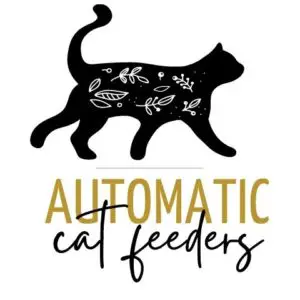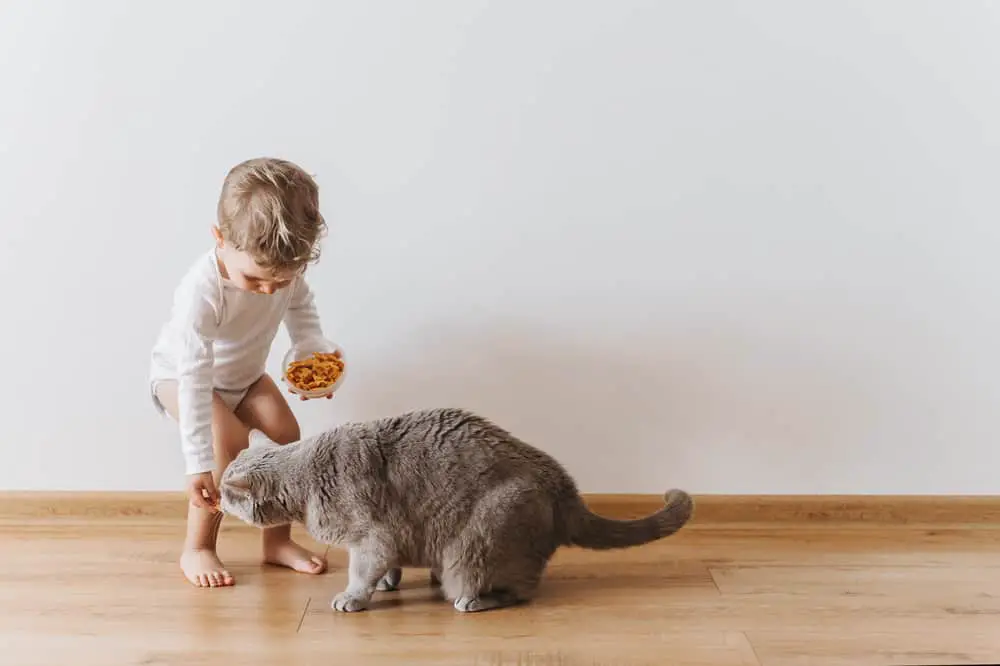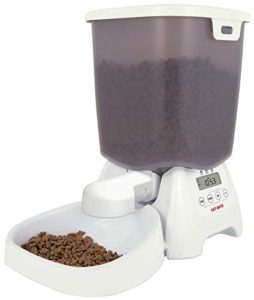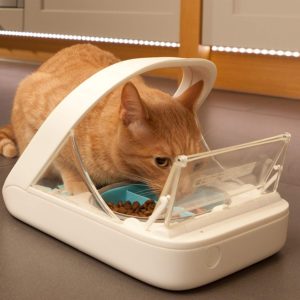The other day, a friend was teasing me by asking if I really spent my spare time writing a blog about automatic cat feeders.
He couldn’t get over it. Really. (I’ve known this guy since kindergarten.) But why? Are you really that geeky? Ha! With friends like that . . . But that got me thinking. Why, indeed?
It’s actually pretty simple: two reasons. One is that I am pretty geeky that way. It’s just how I role. These machines are sometimes kinda like Rube Goldberg contraptions and I love get inside them and figuring out what makes them tick. Some of them are utterly ingenious.
The second reason is more substantial.
Those of you who read this blog know this stat already: Sixty percent of all American pets are overweight or obese. It’s bad enough we suffer from obesity in such proportions, but now we’re making our pets sick. There are all sorts of ways to deal with this growing problem, but one easy way is to control how much you feed your cat and how often.
And that process, I truly believe, is made easier with an automatic cat feeder. It’s the one way I think I can make the most difference. Not the only way, but one great way.
And it’s in that spirit that I’m write this buyer’s guide. The right automatic cat feeder can help you keep or your cat healthy. It’s not the only way or the only thing, but I truly believe that it can help you in terms of your cat’s weight. It did me and our cat, Jonesy.
A Buyer’s Guide for the Rest of Us
There’s a dizzying array of feeders. Different sizes and shapes and techie functionality, etc. So whether you need a cat food dispenser because your cat’s getting you up at 5 a.m. or has grown obese, I’m going to try to break things down in a simple way to help you find the right automatic cat feeder for you and your furry friend.
So here’s the stuff you need to keep in mind.
Gravity or Automatic
The first order of business is whether you want an a gravity feeder or one of those fancy automatic dispensers.
What’s the difference?
Well, the gravity feeder doesn’t get plugged in or juiced up with batteries. Gravity does the work. Typically,, the food slides down a chute. As your cat eats her food, the kibble in a hopper, or container, slides down to replenish what’s been consumed.
But what if your cat’s overeating? Yeah, I know. It’s not that great. You just don’t have that much control though these dispensers are convenient.
Automatic Cat Feeder
An automatic cat feeder gives you substantially more control.
This is an electronic thingamajib that allows you to control the number of feedings through a day or days and the amount dished out to your cat. Some feeders can even feed more than one cat.
Huge difference.
With gravity units, you’re relying on your cat not to gorge himself. With an automatic cat feeder, you program the unit and it dishes out the amount of food at the appointed times.
It’s not perfect. So far, automatic cat feeders have proven to be rather imprecise in their fidelity of the portions they dish out, but they’re a huge improvement over gravity feeders.
What Kind of Cat Do You Have?
So the first question you want to ask yourself is this: Can I trust my cat to graze all day long and not overeat? The second question you need to ask yourself is, Do I need to control the number and size of each meal my cat eats?
Your answer to either or both those questions will determine if you can get by with a gravity feeder (which is typically cheaper) or you need an automatic cat feeder.
Feeder Capacity
Once you’ve decided, the next item up for consideration is . . . the capacity of the hopper.
A hopper, as I’ve noted earlier, is the large (or small) container where the food goes. Some cat feeders don’t have a hopper. They store the food within the trays built into the unit. Some of dispensers have enormous hoppers that can hold 20 or more cups or more of dry food.
Here’s the different between two hopper sizes for a gravity feeder.
Why is this important?
The size of the hopper determines how much food you can pour into the unit, which determines how often you have to refill it. The larger the hopper, the more meals you can schedule over time.
You want to set all the meals for a week or more? Well, then, you’ll want to get a feeder with good capacity and a timer that allows for that functionality.
How large will depend on how much your cat eats per meal and per day. If programming meals far in advance isn’t as important as is making sure the portions are dead solid perfect because you’ve got your cat on a diet, then you might look at a feeder that has no hopper.
Here’s an example on a feeder without a hopper.
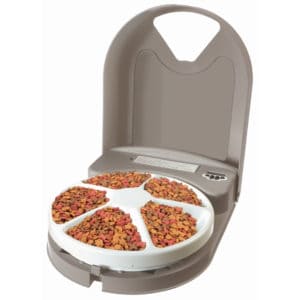
In this case, you control the portions you pour into the various trays. Not as convenient but you have complete control over portions. (By the way, this feeder is one of my favorites. It’s a great feeder if this is the kind of dispenser you’re looking for. Just saying.)
Follow me?
So look a this feeder. This one has a large capacity hopper and is also a good, solid feeder.
Number of Meals Per Day
Once you’ve gotten squared away on the general food storage capacity of your feeder, you’ll need to determine how many meals you’ll need the dispenser to dish out on any given day.
How often to do you feed your cat. Does she eat small meals all day long. Do you feed him in the morning and the evening. Three times a day. Do you have two cats on slightly different schedule?
You get the point. The gravity feeders have food available all the time. Gravity is pulling the cat food down the chute as soon as your cat eats. Automatic cat feeders, on the other hand, are much more secure. Food is only available when you program the unit to dish out the meal.
So you’ll want to pay close attention to how many meals per day an automatic cat feeder allows you to program. There is no standard. There are some as few as three and some as many six. (Here’s a six-feeder right here.)
Take the time to determine how often you want the feeder to provide meals per day. This as much as any factor will determine which feeder to purchase.
Portion Control
To me, this is the most important factor. I’m in this for our cats. I don’t want them to be overweight or obese. I don’t want them to suffer from diabetes and other chronic diseases. So I’m declaring my biases outright.
With automatic cat feeders, you can control the amount of food dispensed at each meal. Some you can calibrate down to one teaspoon at a time. And many of them have 39 settings, each going up by a teaspoon at a time.
That’s pretty tremendous control over portions. Yes, it’s true: the portioning systems in these machines is at best a ballpark. Will your unit dispense a bit more food than advertised? Yes. But all in all, they’re pretty good.
This is why I believe automatic cat feeders can be part of the solution. You program the amount of food and the number of meals and the machine will take care of the rest. No more overfeeding; no more overeating.
Wet Food or Dry Food
I know what they say. Wet food is better for your cat. Maybe. I’ve looked into this quite a bit and the state of the art, at this point is that dry food is fine. Here’s an article from the Cornell University Feline Health Center in the College of Veterinary Medicine.
I’ll just cut to the chase. Dr. Francis Kallfelz, DVM, Ph.D., board certified by the American College of Veterinary Nutrition and James Law professor of nutrition at Cornell University College of Veterinary Medicine, says wet or dry food is basically a none issue.
“Dry food is fine as long as it is complete and balanced,” he said.
There’s no doubt that some cats like wet food better. But . . .
These cats may consume too much if they are allowed free access to food. Of course, this may occur with dry food as well. “Food with average palatability may be preferable,” says Dr. Kallfelz.
So what type of food you feed your cat is critical in deciding what type of automatic cat feeder to purchase. I will tell you that the vast majority of feeders dish out only dry food.
But there are feeders that can accommodate either semi-moist and moist food. (Check some of these out …. )
If you’re feeding your cat wet food, some of the feeders will come with ice packs, which is great as they’ll help keep the food fresh longer. However, don’t leave the food out for more than 24 hours, even with ice packs.
Meal Security
If you have more than one cat and one them is a bit more dominant and steals food from the other, than you want to take this meal security into serious consideration.
There are on the market automatic cat feeders that have RFID technology. What this does is that you attach a little collar tag on your cats. The feeder will then read those tags and only open up the lid to right cat.
If the wrong cat tries to eat the food, the feeder’s lid will close. The SureFeed SureFlap feeder is an example and terrific option if you need this functionality.
Indoor or Outdoor
And, finally, do you need your feeder indoors or outdoors? With some exceptions, I’d say that most automatic cat feeders aren’t really meant to be housed outdoors.
The gravity feeders are probably best if you want something outdoors. If you’re cat spends the whole day inside, then you’ll be fine with an automatic cat feeder.
Conclusion
So there you have it. There are some other things to consider, but there not major. I’m talking about things like size and weight. These are mostly issue if, say, you rent a small apartment in the middle of Manhattan.
How about the bowl? Plastic, ceramic or stainless steel? If your cat has had chin acne, then definitely look for feeders that provide a ceramic or stainless steel bowl.
But for the vast majority of you, if you keep in mind my simple guide, you’ll wind up buying the best pet feeder for your cat, which is my goal in all of this.
So just remember to run through these few checklist items before you begin your search for that perfect cat feeders:
Gravity or Automatic
Feeder Capacity
Number of Meals
Portion Control
Wet or Dry Food
Meal Security
Indoor or Outdoor
Good luck on your hunt for an automatic cat feeder. If you have any questions, make sure to post it below and I’ll answer then.
